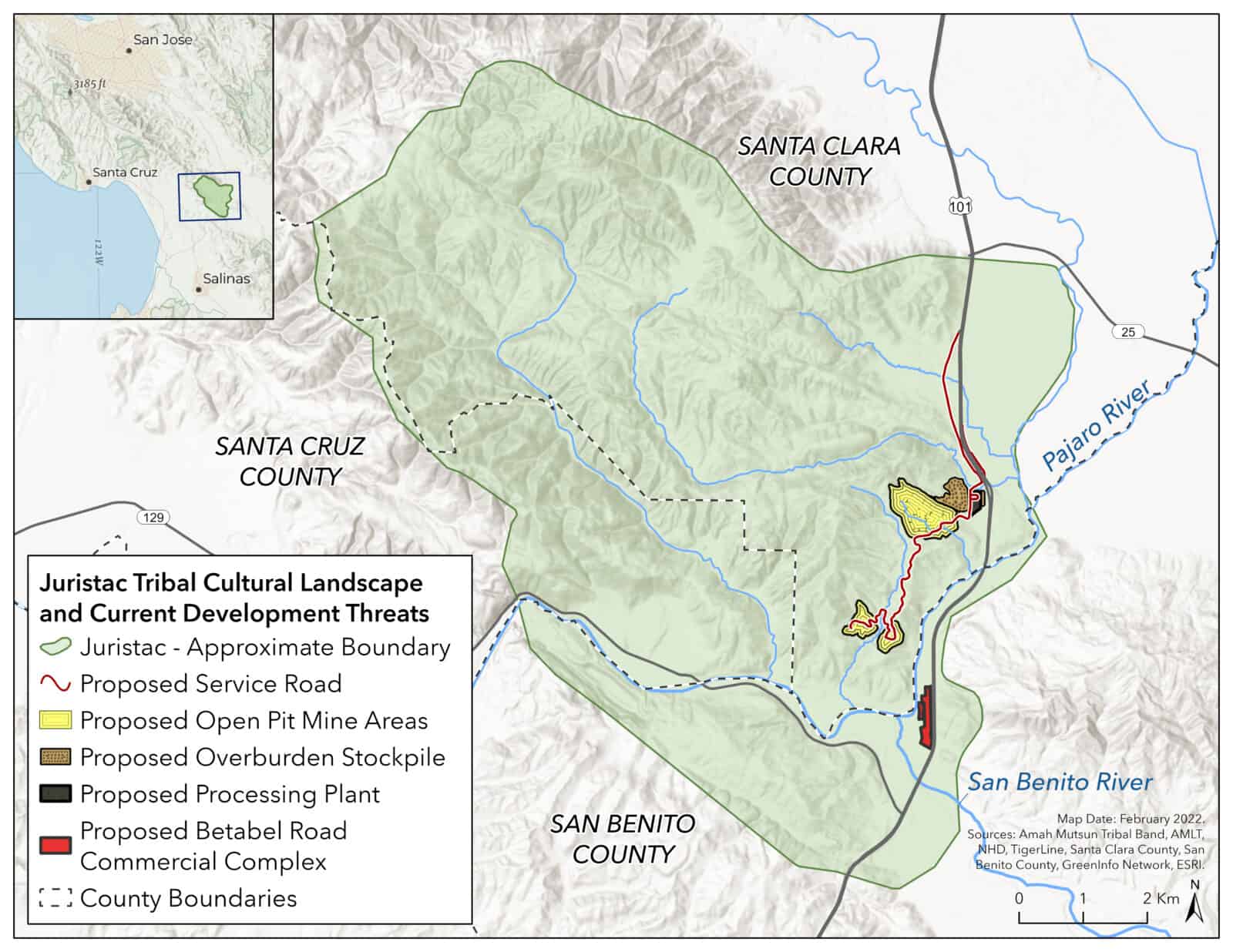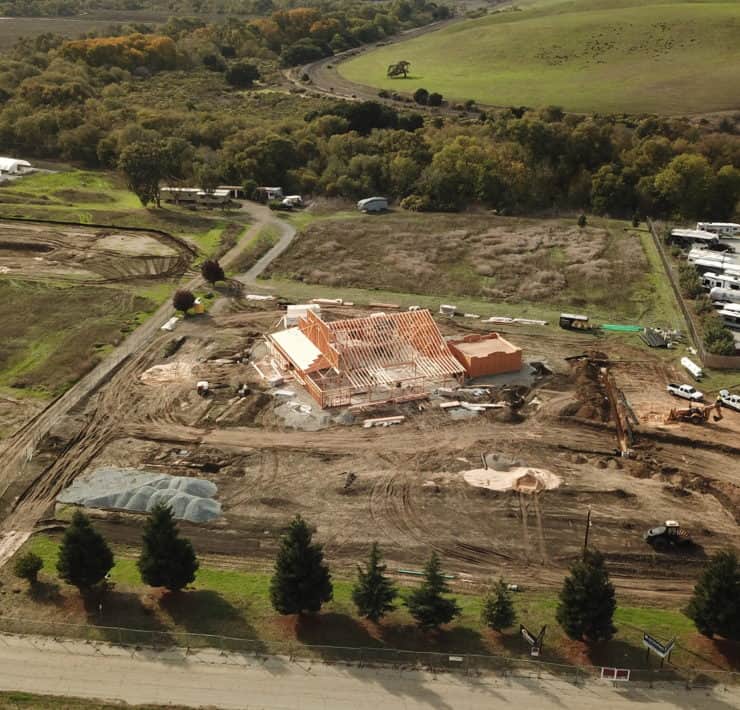
LANDBACK to the Amah Mutsun Tribal Band
By Jeanne Ferris
The fight for Juristac to remain an open space free from asphalt and concrete continues. A lawsuit was filed on December 9, 2022, in San Benito County by the Amah Mutsun Tribal Band seeking protection from commercial development for their ancestral home (a site referred to as the Betabel Project).
(See the News From Native California blog: Take the High Road to Juristac on December 9, 2019—published three years from the date of the current lawsuit.)
Not only is this a key wildlife corridor that spans from the Santa Cruz Mountains to the Diablo and Gabilan Ranges, but it is also one of the last remaining open spaces—as well as an ancient site of valuable religious and archaeological history.
The Betabel (Spanish for beet) Project is also near the confluence of the Pajaro and San Benito Rivers which as history proves, commercial development eventually destroys the natural surrounding areas with a high impact of material byproducts and waste.
Formerly fields of sugar beets at the turn of the century with the harvest loaded directly onto a freight train for export, the Betabel project is now approximately 125 acres of litigious contention.
So why is this site now a focus of dispute?
Because the developers also known as the McDowell Charitable Trust still refuse to acknowledge or comply with CEQA regulations (California Environmental Quality Act) despite several years of facts given.
Their lack of compliance is a brazen action of greed intent on their agenda, subterfuge at best. In addition, the State and Zoning laws, the County General Plan, and Zoning Code are also being ignored.
County voters have already rejected efforts to rezone this area for future commercial developments so why this continued aggressive move?
Who holds McDowell Charitable Trust accountable if not the county?
Trustees Victoria and Thomas John “Rider” McDowell for the McDowell Charitable Trust (MCT) have utilized loopholes in the county planning guidelines to continue with their project—perhaps in a concerted effort to recoup a return on their investment.
Ignoring demands for Environmental Impact Reports and refusing to include the Amah Mutsun Tribal Band’s perspective on the Betabel Project is in blatant disregard of California’s Native American Heritage Commission laws, local ordinances, and codes as per their website: https://nahc.ca.gov/native-americans/
State Preservation Laws
Administrative Code, Title 14, Section 4308
“No person shall remove, injure, deface or destroy any object of paleontological, archaeological, or historical interest or value.”
CCR Section 1427
“Recognizes that California’s archaeological resources are endangered by urban development and population growth and by natural forces. The Legislature further finds and declares that these resources need to be preserved to illuminate and increase public knowledge concerning the historic and prehistoric past of California.
Every person, not the owner thereof, who willfully injures, disfigures, defaces, or destroys any object or thing of archaeological or historical interest or value, whether situated on private lands or within any public park or place, is guilty of a misdemeanor. It is a misdemeanor to alter any archaeological evidence found in any cave, or to remove any materials from a cave.”
There are many reasons why the Amah Mutsun Land Trust should be honored and one of them is because they are the original occupants of the soil in Betabel/Juristac. Respecting their ancestral home remains paramount in healing past traumas incurred against them.
The ancestors of Amah Mutsun are buried where the developers want to build a gentrified roadside market with an asphalt parking lot. And now forcing litigious proceedings is more shame piled on an already shameful history tied to the land.
Current real estate methodologies include arcane colonial laws and false narratives that invite reformation—this includes scrutinizing how counties approve future developments on Indigenous land. Including Indigenous sovereignty is imperative in light of the historical fact that the genesis of all real estate was settler appropriated and absconded by bloodthirsty marauders.
The California landscape is symbiotic with California Native Americans that cry for truth and healing.
Earth is Mother. Regardless of cultural or geographic boundaries, as her children/stewards, human beings share the responsibility to protect her from defilement and rabid consumption.
The MCT’s alleged altruistic motive has been sullied by actions of a complete disregard for its fellow man including a lack of respect for ancient burial grounds.
The San Benito County and the Board of Supervisors ignored their California Native neighbors’ appeal for inclusion and instead hitched their wagon to MCT’s visions of grandeur and immense profit by approving the development of a 108,425-square-foot commercial roadside attraction.
Profit and revenue drive most real estate ventures, especially when oil and water rights are the bottom lines—those with “deep pockets” will utilize attorneys when thwarted by compliance and laws as recorded by historians.
The San Benito County Board of Supervisors shot down Amah Mutsun’s first appeal at a county hearing allowing MCT to proceed.
Meanwhile…
“The Integrative Cultural Resource Survey uncovered individual artifacts, identified ethnobotanical resources such as plants traditionally used by the Mutsun-speaking Ohlone for a variety of food, medicinal, and ceremonial purposes, and identified the likely location of numerous tribal cultural resources.
The survey also offered a number of recommendations to avoid or reduce impacts to Indigenous cultural resources at the site. The Amah Mutsun shared the results of the ICRS with the County and Real Party in a confidential 75-page report on July 8, 2022.” —Excerpt from official 2022-12-09 Petition and Complaint
Glossing over these findings is blatant civic irresponsibility and in doing so, the County has violated numerous county and state laws, hence, the Amah Mutsun’s lawsuit rightly names the entire Board of Supervisors in their official capacity.
As far back as 2013, the San Benito County Planning Department has been in non-compliance with the Tribe’s cultural input regarding its General Plan by excluding them in the 2035 General Plan process.
By not including Juristac in a protective land designation in the General Plan as per Tribal request, it allowed the site to remain unprotected. Because the County failed to incorporate Tribal cultural resource knowledge into its foundational planning documents, its vulnerability became a selling point.
Questions regarding these inequities were emailed to Abraham Prado, Assistant Director of Planning, Building & Code Enforcement, and the following was his response along with the Special Meeting Minutes dated October 12, 2022:
“The Betabel EIR was certified at the October 12, 2022, Planning Commissions meeting. Two appeals were subsequently submitted. The appeals were heard on November 8, 2022, by the Board of Supervisors. The Board of Supervisors made a motion to follow staff recommendation, county counsel’s recommendation and the decisions by the Planning Commission.”
Ten citizens were identified in the Special Meeting Minutes who spoke against the Betabel project.
“Resource Management Agency Assistant Director of Planning and Building Abraham Prado gave a presentation and background of the appeal of the Betabel Commercial Development Conditional Use Permit, project description, Planning Commission recap of the Special Meeting on 10/12/22, two appeals to the planning commission decision were filed, proposed projects on site such as convenience store, fueling area station, restaurant, amusement buildings, visitor center, open space buffer area, motel, and outdoor event area, environmental issues evaluated in detail in the EIR, significant and unavoidable environmental impacts such as damage to scenic resources, loss of important farmland, increases in vehicle miles traveled, and impacts to tribal cultural resources, alternatives evaluated in the EIR, and statement of overriding considerations.
Appellant Andy Hsia-Coron from Protect San Benito County gave a brief background of reasons for the appeal of the decision on this project. Mr. Hsia-Coron stated many projects have been rushed through. This current proposal was voted against by the public in March 2020, he stated the EIR is flawed in many ways, that the EIR should be fixed before getting approved, and that the board should hold off on this project until the board knows how the people want to proceed with this project.” —-Excerpt from Public Hearing Minutes 11-08-22
Despite two appeals filed along with public protests, and vigorous discretionary caution overridden—the Betabel project was approved.
“[Mr. McDowell] won’t compromise on cultural easement by the river,” Amah Mutsun Chairman Lopez said. “We want to replant native plants near our sacred site, and we would need more than 100 gallons of water a day [than the proposed allotment.] We can’t have any of our traditional ceremonies the way the project stands.”
Is this the legacy the McDowell Charitable Trust chooses to leave for the next generation and the future?
Furthermore, on what occasion does charity begin?
Perhaps the real question—is this real estate transaction of the highest good for all concerned?
We are Amah Mutsun, of the lands known to us as Popeloutchom.
Home to our four-legged, winged, finned, and plant kin;
they have provided us with all that we needed for millennia—we will care for them.
Resting place of those that came before us and cradle of those yet to come,
they are sacred—we will protect them.
—Conservation Mission





